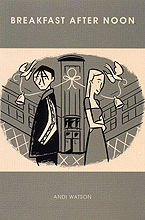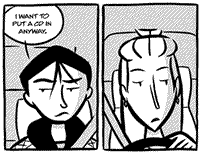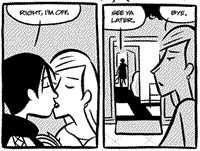>> The Friday Review: The Tale Of One Bad Rat
>> The Friday Review: Cathedral Child
More...

 Writer/Artist: Andi Watson
Writer/Artist: Andi Watson
Collecting BREAKFAST AFTER NOON #1-6
Price: $19.99
Publisher: Oni Press
ISBN: 1929998147
Whatever your thoughts about superheroes, it's hard to argue with the assertion that comics is a medium that often seems swamped by a preponderance of stories featuring muscle-bound men with their underwear on the outside, and bizarrely breasted women wearing costumes comprising as much fabric as the average handkerchief.
Comic book stories with non-superpowered characters are still relatively few and far between in comparison to the vast swathes of spandex based pamphlets produced each month. Even when they do come around, chances are that there's still something out of the ordinary in terms of character or situation, be it Daniel Clowes' parade of misfit freaks in DAVID BORING or the hypernormal Alex Hunter trapped in Gary Spencer Millidge's anything-but-normal STRANGEHAVEN. So, ever fancied reading something resolutely down to Earth that you could completely identify with? If so, BREAKFAST AFTER NOON could well be that book.
On the face of it, the premise of BREAKFAST AFTER NOON is quite simple. Rob and Louise are a thoroughly normal couple from the Potteries region of the UK. Rob has aspirations no loftier than a CD player for the car and a regular pint or two after his midweek 5-a-side Football match with the lads. There's an upcoming wedding to be organised (but Louise is doing most of that) and they've begun trying to start a family. Life is sweet. That is until the opening of the story, where Rob and Louise have both just been made redundant from the old and venerable firm of Windsor Pottery. Faced with having their world turned upside down, how do they react?
Rob refuses to accept (and thus deal with) his new situation. He sets about trying to get his old job back, while still planning for holidays and new CD players, and sees even the act of paying in his redundancy cheque as tantamount to accepting defeat. Rather than settle for the more prosaic world of the Job Centre, Rob sinks into a world of small-time wheeler-dealing in stolen goods, desperately trying to retain his self-respect by remaining master of his own destiny, yet seemingly unaware that he's alienating his friends and drifting ever further away from Louise.
 Louise, on the other hand, takes a far more pragmatic approach and embarks on a programme of training courses, though work is still hard to find due to the catch-22 of having no relevant experience, and being unable to gain experience without getting a job first. As Rob becomes ever more introspective, Louise makes friends on her course and picks up her social life. Something has to give...
Louise, on the other hand, takes a far more pragmatic approach and embarks on a programme of training courses, though work is still hard to find due to the catch-22 of having no relevant experience, and being unable to gain experience without getting a job first. As Rob becomes ever more introspective, Louise makes friends on her course and picks up her social life. Something has to give...
BREAKFAST AFTER NOON is a bit of landmark for Andi Watson, being his first major creator-owned work without any magical or Science Fiction trappings. Tamsin (from GEISHA) may have been an artist struggling to make her mark, but she was also a cyborg. Caitlin is the archetypal Neurotic Girl Outsider, but still spends her series dimension-hopping by means of a magical SKELETON KEY. Both great stories, but definitely much further removed from real life than BREAKFAST AFTER NOON.
One of the most distinctive things about BREAKFAST AFTER NOON is the artwork. Watson's style has evolved dramatically from the heavy blacks of early SKELETON KEY, through to the more impressionistic style first seen in the final book of that series. It's simple but not simplistic, and very striking. It could be said to share a sensibility with the work of someone like Paul Grist (KANE), in that it can seem overly basic, but does tell the story very effectively. But whereas KANE features very definite and well-defined structures in stark black and white, BREAKFAST AFTER NOON is a little sketchier and features telling use of shading.
BREAKFAST AFTER NOON avoids being politically didactic, steering almost totally clear of any overt Party Political stance. The only section that comes across as at all "preachy" is the scene where Rob meets with his old Trade Union representative, who reflects on the Conservative dismantling of the UK mining industry. But it's possible to spot a few more subtle references. For instance, as Rob and Louise leave Windsor Pottery for the last time, D:Ream's "Thing's Can Only Get Better" (as used in the current government's first election campaign) is heard on the car cassette player. The fact the tape breaks as they drive away makes the choice of song all the more apposite and poignant.
However, Watson does have plenty to say on the changing nature of work. The workforce of the Potteries traditionally engaged mainly in the manufacturing industries. As a greater degree of automation comes into the manufacturing process, companies "resize" and "reskill", with redundancies and even closures being the inevitable outcome. Faced with this dilemma, our protagonists react very differently. Whereas Louise accepts the loss of her job and the need to do something different, Rob has identified himself with the company much more. The way his mates rib him about his "Employee of the Month" awards show that he's taken great pride in being a model employee. His job had become what defined him. In the Job Centre he will only consider doing the same kind of work again ("I'm an assembler, it's what I am"). This conflict is at the heart of the story, and the examination of the consequence is what gives the work its emotional edge.
 Rob and Louise may be the main focus of the story, but Watson also introduces an interesting array of supporting characters. From Dave (the smug and superior self-made-man), to Chris (the unemployed ex-student), they're all distinct and well-realised characters who play key roles, whether in moving the main narrative along or enabling Watson to draw comparisons between them and the main characters.
Rob and Louise may be the main focus of the story, but Watson also introduces an interesting array of supporting characters. From Dave (the smug and superior self-made-man), to Chris (the unemployed ex-student), they're all distinct and well-realised characters who play key roles, whether in moving the main narrative along or enabling Watson to draw comparisons between them and the main characters.
Watson's storytelling is deft, and with a subtlety that is belied by the simplicity of the artwork. Scarcely a panel is wasted, with - as becomes more apparent when reading the series in trade paperback form - many seemingly insignificant details or actions later seen to have major consequences for the plot. For instance, Dave's lecherous behaviour towards a woman in the gym has unwelcome repercussions for Rob, as she later turns out to be his dole officer and delights in making his life a misery. Most of this foreshadowing is recapped or reprised as it becomes significant, so any that the reader overlooks don't render the story incomprehensible, but there's fun to be had in spotting the relevant ones before being prompted.
While being aware of the dangers of confusing the creator with the creation, it's difficult to believe that Watson hasn't been through a similar period of unemployment, given that it rings so true to my own time "between jobs". Mornings cease to exist and the interminable featureless afternoons fill with vacuous daytime television, but somehow there still never quite seems to be time to wash up the latest cereal bowl from the eponymous late breakfast.
Although the story is never quite fixed to any particular date (the only major clue is the mention of it being post-Thatcher) there're still a few subtle reference points that reinforce the association with real life. A well-known Playstation game is recognisable from it's box, Rob wears a Wolverhampton Wanderers football shirt in his weekly 5-a-side. As an aside, we Midlanders take our footy rivalries seriously, and it's testimony to Watson's storytelling that he could make this lifelong Leicester fan care about someone in a Wolves shirt!
If I had to pick holes, then it might be possible to argue that the change of heart by one of the characters towards the end comes on a little quickly and conveniently. The slightly ambiguous ending is probably going to annoy and/or frustrate a few people too, but it works in context as reinforcement to the "slice-of-life" nature of the storytelling. This really is just a slice from the life of Rob and Louise, and - just like real life - events don't often all wrap up nicely and all at the same time.
In summary, BREAKFAST AFTER NOON is that most rare of commodities, a perfect start point for someone who's never been exposed to the medium of graphic storytelling before. As a first impression for the new reader, the art is crisp and clear, and the story flows in an engaging manner. Once drawn in, many people will be able to empathise with the characters and travails. The tragedy is that a "romantic comedy with an edge" of this type - and this well told - would sit smack in the middle of the mainstream if done as a film or a BBC miniseries, and would doubtless find a large and appreciative audience. But of course, being "just a comicbook", mainstream attention isn't a given, and it does seem to have largely bypassed BREAKFAST AFTER NOON. So how about you invite Rob and Louise over for breakfast (just don't expect Rob to wash up) and see if we can do something about this?

This article is Ideological Freeware. The author grants permission for its reproduction and redistribution by private individuals on condition that the author and source of the article are clearly shown, no charge is made, and the whole article is reproduced intact, including this notice.


